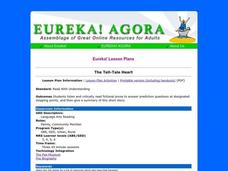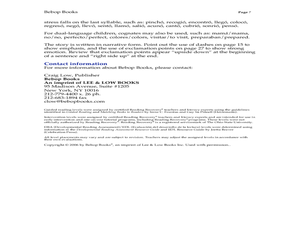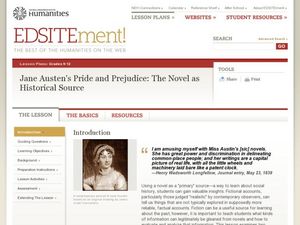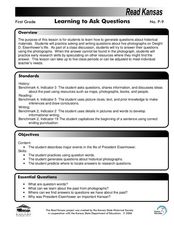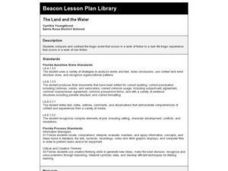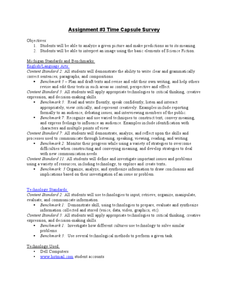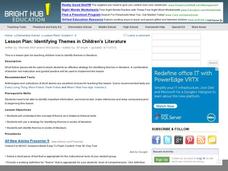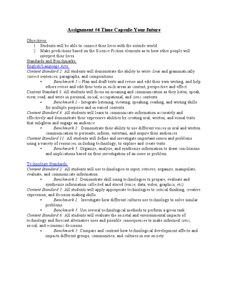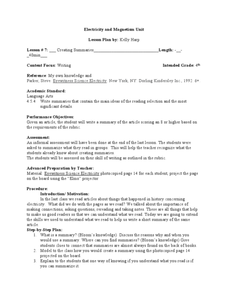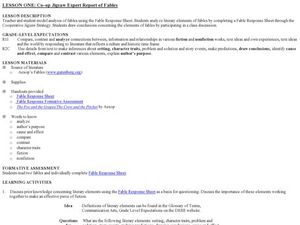Curated OER
Drawing Conclusions from Historical Fiction
Students read historical fiction. In this drawing conclusions lesson, students learn how to draw conclusions from text, specifically historical fiction. Students read Molly's Pilgrim and complete a graphic organizer where...
Curated OER
Discovering Language Arts-Intermediate Fiction
Explore the elements of science fiction. Middle schoolers investigate the literary elements present in science fiction and write their own science fiction stories.
Curated OER
Big Bushy Mustache: comprehension skills
In this comprehension skills worksheet, learners read the book Big Bushy Mustache and complete comprehension activities. Students complete 5 activities including note taking, making inferences, fiction and non fiction, drawing...
Curated OER
Using Details from the Text
Explore non-fiction comprehension strategies with your class. They will visualize daily activities and label a 4 circle Venn diagram with related phrases. They must identify the overlapping sections as "main ideas," then complete a...
Curated OER
Things Aren't Always What They Seem
Learners use video and the Internet to make predictions, draw conclusions, determine conflict and point of view while reading a short story. In this short story analysis instructional activity, students watch a related video and complete...
K5 Learning
Liza's First Spelling Bee
Learners read about Liza's first spelling bee before answering six reading comprehension questions. Skills include identifying similarities, making inferences, drawing conclusions, and answer questions based on explicit information in...
K5 Learning
The Fox and the Little Red Hen
Read about the fox family that decides to cook a hen for dinner. After reading, individuals answer questions about the elements of plot in the story. They require drawing conclusions, making predictions, and describing specific...
Curated OER
Identifying Science Fiction
High schoolers discuss works of science fiction that they read, highlight aspects that made each a part of science fiction genre, identify formal literary elements, and discuss ways each can be developed through science fiction.
Curated OER
Sherlock Holmes: Teaching English Through Detective Fiction
Middle schoolers read examples of mysteries and detective fiction. With a focus on Sherlock Holmes, they are introduced to the techniques for reading properly. In groups, they define new vocabulary, make predictions and summarize the...
Curated OER
The Tell-Tale Heart
Readers listen and critically read fictional prose to answer prediction questions at designated stopping points, and then they give a summary of the short story. This lesson is ideal for English language learners developing English...
Curated OER
Guided Reading with Elizabeti's Doll
Practice reading strategies using Elizabeti's Doll by Stephanie Stuve-Bodeen. Readers utilize decoding and comprehension strategies before, during, and after reading the story. A detailed list of text features, high frequency words,...
Curated OER
Jane Austen's Pride and Prejudice: The Novel as Historical Source
Students examine historical fiction as historical sources. In this historical fiction lesson, students analyze excerpts from Jane Austen's Pride and Prejudice as well as Mary Wollstonecraft's A Vindication of the...
Curated OER
Main Events in Fiction
Students complete a literature analysis of fiction texts to study elements of fiction. In this fiction analysis lesson, students read various fiction texts and examine them to learn about fiction elements. Students learn to draw...
Curated OER
Learning to Ask Questions
First graders analyze historical materials and create questions about Dwight D. Eisenhower. In this question writing instructional activity, 1st graders ask and answer questions about the life of Eisenhower. Students write about...
Curated OER
The Land and the Water
Third graders read "The Land and the Water," a fictional short story and an article about John F. Kennedy, Jr. and compare and contrast fictional tragedy to a non-fiction tragedy. They fill out a Venn diagram and write an essay using...
Curated OER
Time Capsule Survey
Here's a fun way to incorporate technology into your curriculum. E-mail each of your class members a picture and 10 questions about the photo. Individuals then imagine the story behind the image and e-mail back their responses. Although...
Curated OER
Mr. Lincoln's Whiskers
Learn about the events that helped shape the United States of America. Elementary schoolers explore the Civil War with six different activities. Each activity has a different focus: literature connections, primary sources, vocabulary,...
Curated OER
Lesson 2: Important Person
What kid wouldn't love to learn about George Washington? The class reads a simplistic biography about George Washington to find out why he is so famous. They chart the things he did, as well as what makes a non-fiction book a biography....
Curated OER
Historical Fiction: Persuasive Presentation
Fifth graders read a book addressing a specific historical time period that was chosen by their working group. They complete journal entries as they read the book. They create a group PowerPoint explaining the personal point of view and...
Curated OER
Identifying Themes in Children's Literature
Identifying themes in literature is the focus of the language arts lesson plan presented here. Learners read short pieces of fiction and practice the skill of identifying the themes present in each one. The bulk of the lesson consists of...
Curated OER
Parliamentary Newsroom : Developing Media Literacy
Pupils explain and examine the selection, development, sources, transmission and impact of news on the public. They write a brief essay on the topic: "The Public Must Be Critical In Their Assessment of the News Before Drawing Conclusions."
Curated OER
Assignment #4 Time Capsule-Your Future
Class members create a PowerPoint presentation showing artifacts they would include in a time capsule. The artifacts and explanations reflect personal hobbies, grooming choices, school life, etc. A great way for class members to...
Curated OER
Creating Summaries
Fourth graders generate written summaries from non-fiction articles. In this writing lesson, 4th graders determine what must be included in writing a good summary and then work in small groups to construct summaries after reading...
Curated OER
Cooperative Jigsaw Expert Report of Fables
Young scholars research literary elements of fables. In this literature lesson, students analyze literary elements of fables. Young scholars work collaboratively using a jigsaw strategy to analyze literary elements.











